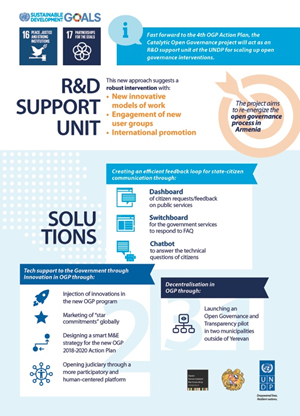News, events
UNDP Armenia’s Catalytic Open Governance Project
13.11.2018
What if Governments where like Facebook or Twitter: user-oriented open and effective platforms?
Over the past years, the UNDP in Armenia has actively supported the government of Armenia to advance the open governance agenda. Through its Social Innovation Lab, UNDP in Armenia has been actively involved in a range of areas, from crowdsourcing the Second and Third National Action Plans to introducing new ICT solutions to make new innovation interventions, engagement of new user groups and international promotion of open governance processes.
Back in 2015, with the technical assistance provided by the UNDP, Armenia won top award at OGP International Competition for its Smart Municipality project.
As part of the “Innovation for Development” project (#Inno4Dev) funded by European Union and implemented by Kolba Innovations Lab, a series of idea competitions took place within the government aimed at innovating across the public sector. These competitions served as a platform and channel for public servants to identify a set of public administration issues and suggest solutions. Among various other non-conventional methods that helped to unleash the creativity of those bureaucrats were workshops, public meetups, pop-up labs as well as Public Sector Innovation weeks.
Fast Forward to the 4th OGP Action Plan, which has 12 commitments, Catalytic Open Governance project acts as an R&D support unit at the UNDP for open governance scaling up interventions. This new approach suggests a robust intervention with new innovative models of work and international promotion of OGP commitments.
What do we plan to do?
- Had a bad experience with a public service? What if instead of complaining to your friend or posting on social media you could rate the service and let the decision-makers know what can be improved and what the citizens are satisfied with?
UNDP’s Citizen satisfaction dashboard interoperable with the existing data management solutions such as e-gov.am, and iGov app. The Dashboard can help the citizens monitor the availability and quality of public services by simply answering questions on timeline of delivery of the service, satisfaction with the service and so forth.
The Citizen Satisfaction Dashboard solution developed by the Catalytic Open Governance Project was involved in the 4th National OGP Action Plan and has the potential to lay grounds for exemplary reforms and impact citizens in the country of implementation.

- Ever had difficulty to find information on public services (what documents do you need for certain processes, what is the timeline of delivery, how much does the service cost)? What if there could be a platform with readily made answers to all those questions?
Our Switchboard will help to collect Frequently Asked Questions about public services aggregated by citizens. The Switchboard will be integrated into the Government-owned e-gov.am online platform or dedicated website of the Ministry of Justice. Citizens will be filling in the answers and questions for the FAQs (based on their experience and knowledge) and will edit it based on themes and sectors. This tool can help public services to become more user-friendly and can strengthen civic participation.
-You’ve heard about rating doctors, but what about judges?
To achieve open governance and ensure effective grassroots monitoring of the integrity of public agencies and officials, people should have access to information on laws and regulations, as well as to justice and legal institutions. We propose an on-line system with access to data on the results of the activities of the Supreme Judicial Council of the RA. This system will promote continuous dialogue within the Judicial System and will serve as an information source for researchers, media, and the public.
A feedback mechanism will be integrated into the official website of the Supreme Judicial Council which will allow the citizens to rate judges and give feedbacks. The platform will be used as an internal tool for the Supreme Judicial Council to collect quantitative and qualitative feedbacks and combine with official rating body.
What about the role of space for civic empowerment?
In classical roman beliefs, space had a Spirit, called genius loci, which controlled the environment, mood and often the destiny of people inhabiting it. Modern architecture suggests a more structured knowledge of programming the behavior of people in the space by controlling the distribution of zones, patterns, lights and animated objects in an area. The Open Government Partnership aims to secure concrete commitments from governments to their citizenry to promote transparency and empower citizens. How much does the physical environment enable citizens to give feedback to the government which is the first catalyst towards the participatory governance? Can we program behavior by putting an intention in designing a space? Can we program larger social behavior through the design of the citizen reception center in the main Government building?
We will know soon.
Our team of experts is working on the products and solutions and soon we will share the first findings. Stay tuned for updates and check this infograph for details.
